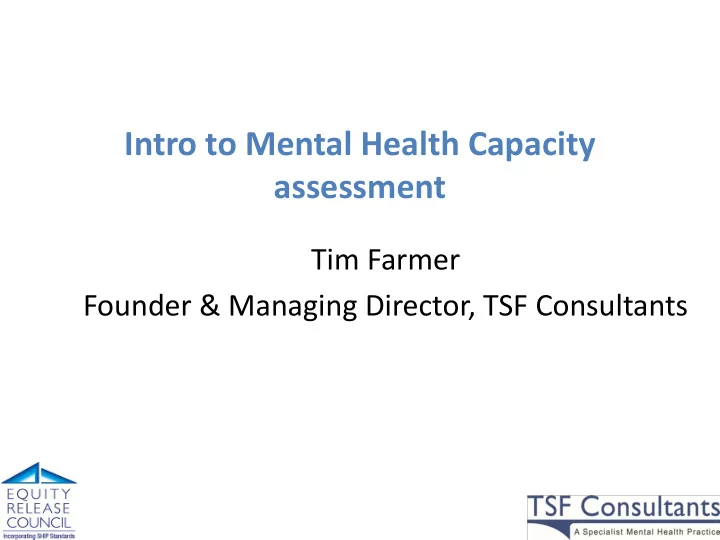

Intro to Mental Health Capacity assessment Tim Farmer Founder & Managing Director, TSF Consultants
Intro to Mental Capacity • Mental Capacity - one of the fastest growing areas of law in the UK • ‘Mental Capacity’ refers to an individual’s ability to make a decision • Possible to bring a successful claim that an individual lacked capacity even after their death • If it is found that an individual lacked capacity at the time of entering into a contract the Courts can revoke the contract
What is the Mental Capacity Act? The Mental Capacity Act 2005 is an Act of Parliament. Its primary purpose is to provide a legal framework for acting and making decisions on behalf of adults who lack the capacity to make particular decisions for themselves
The 5 statutory principles I 5 principles are outlined in Section 1 of the Act – designed to: • protect people who lack capacity to make particular decisions • maximise their ability to make decisions • or to participate in decision-making, as far as they are able to do so
The 5 statutory principles II 1) A person must be assumed to have capacity unless it is established that he/she lacks capacity 2) A person is not to be treated as unable to make a decision unless all practicable steps to help him/her to do so have been taken without success 3) A person is not to be treated as unable to make a decision merely because he/she makes an unwise decision
The 5 Statutory Principles III 4) Any act done, or decision made, under this Act for or on behalf of a person who lacks capacity must be done, or made, in his / her best interests 5) Before the act is done, or the decision is made, regard must be had to whether the purpose for which it is needed can be as effectively achieved in a way that is less restrictive of the person’s rights & freedom of action
The 2 stage capacity test I • In order to assess capacity, the following 2-stage test must have been followed: • The first stage (or diagnostic stage) asks following questions: 1) Is there an impairment of or disturbance in the functioning of the person’s mind or brain? 2) Is the impairment or disturbance sufficient that the person lacks the capacity to make that particular decision?
The 2 stage capacity test II • The second stage of the test (or functional test) dictates that the person is unable to make a decision if they cannot: 1. Understand information about the decision to be made 2. Retain that information in their mind 3. Use or weigh-up the info as part of the decision process 4. Communicate their decision • If a person lacks capacity in any of these areas, then this represents a lack of capacity
Unwise decisions & Best Interests • Can only act in best interest if the person lacks capacity • Can only make unwise decision if a person has capacity Best interests is not a test of “substituted judgement” (what the person would have wanted), but rather it requires a determination to be made by applying an objective test as to what would be in the person’s best interests (MCA Guidance Notes)
Where we often go wrong • The single most common mistake when assessing mental capacity is asking the wrong question • Using the wrong test • Making a moral decision about the outcome & allowing that to determine their decision • Assuming a lack of capacity • Failing to validate the info given
Reports • Must clearly identify the questions being asked & where possible quote the responses given • Directly reference the MCA 2 stage test • Evidence how the person did or did not meet the criteria of the 2 stage test i.e. Understand, Retain, Weigh up & Communicate • Identify & discuss any points of controversy
Questions?
Recommend
More recommend